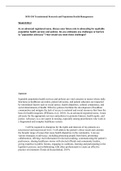NUR-550 Translational Research and Population Health Management
Week 8 DQ 2 As an advanced registered nurse, discuss your future role in advocating for equitable
population health services and policies. Do you anticipate any challenges or barriers to "population advocacy"? How would you meet these challenges?
Answer:
Equitable population health services and policies are vital concerns to nurses whose daily
functions as healthcare providers, patient advocates, and patient educators are impacted by interrelated factors such as social justice, health disparities, cultural competence, and social determinants of health. Effective policies facilitate the development of healthier communities and mitigate the lack of access to material and social resources that form the
basis for health inequities (Williams et al., 2018). As an advanced registered nurse, I must
advocate for the appropriate services and policies to promote fairness, health equity, and justice. Advocacy is a core aspect in nursing, especially among practitioners who work in
a fragmented and complex healthcare system.
I will be required to champion for the rights and interests of my patients at a microsocial and macrosocial level. I will address the patient’s direct needs and consider the broader range of issues that cause health disparities in the community. I can use various strategies in advocacy, including protecting people from harm, promoting collaboration, offering vital information for decision-making, communicating the patient’s
preferences, sharing healthcare stories with elected officials and community leaders, giving expertise in public forums, engaging in coalitions, learning and participating in the legislative process, and collaborating with other professionals to create an effective practice environment (Turale & Kunaviktikul, 2019). I anticipate to encounter various challenges and barriers in advocacy, such as a rigid government, leaders who do not like being challenged or corrected, patients who are
scared to report the problems they are facing, a bureaucratic institution, and lack of resources. These challenges require adequate preparations to advance an effective argument that will change people’s perspectives. I will also accumulate power through expertise, networking, and leadership opportunities to avoid feeling powerless in a bureaucratic system (Nsiah et al., 2020). I must study the law to identify suitable avenues for advocacy. I can access resources by collaborating or joining institutions that share my
advocacy interests, such as professional nursing organizations and interest groups.
Nsiah, C., Siakwa, M., & Ninnoni, J. P. (2020). Barriers to practicing patient advocacy in healthcare setting. Nursing open, 7(2), 650-659. https://doi.org/10.1002/nop2.436
Turale, S., & Kunaviktikul, W. (2019). The contribution of nurses to health policy and advocacyrequires leaders to provide training and mentorship. International nursing review, 66(3), 302-304. https://doi.org/10.1111/inr.12550
Williams, S. D., Phillips, J. M., & Koyama, K. (2018). Nurse advocacy: Adopting a health in allpolicies approach. Online Journal of Issues in Nursing, 23(3). DOI:
10.3912/OJIN.Vol23No03Man01
Week 8 DQ 1 Discuss the role of translational research in advancing equitable access to health
care and preventative services and policies based on population health. Provide an
example of a local health care policy that has been recently enacted and or is
awaiting legislative passage that has been influenced by research.
To have a meaningful discussion of the topic, let us go first with its foundation, which is research. Research is a process of systematic inquiry that entails collecting data, documentation of critical information, and analysis and interpretation of that data/information by suitable methodologies set by specific professional fields and academic disciplines. It is the creation of new knowledge and using existing knowledge in a new and creative way to generate new concepts, methodologies, and understandings.
Translational research adopts a scientific investigation/inquiry into a given problem facing health practices to surmount such issues, which help to raise aggregate health performance.
Translational research appears as early as 1993; relative references to these terms were to research about cancer. The words "research translation" and "translational research" appeared in the literature in the 1990s in response to significant increases in basic or clinical science discoveries with a slight improvement in the provision of health care and health outcomes. Translational research as a concept has been widely used and applied in the scientific literature for more than a decade. Translational research is geared toward bridging the gap between practical laboratory practices and performance-related issues facing the health profession. The concept and tenets of translational research are of the initial value in the health sectors of any nation (Robert Wood Foundation, 2021).




